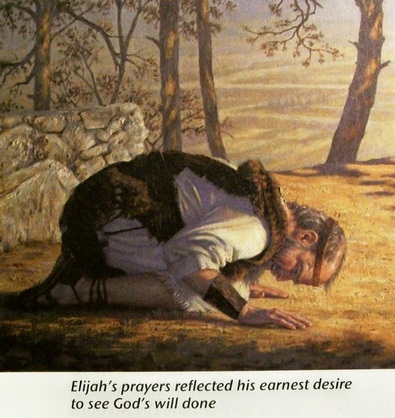The Book of 2 Kings

2 Kings continues the stories of the great prophets Elijah and Elisha. It also tells the history of the northern and southern kingdoms until they were both finally conquered. In both kingdoms God's prophets continually warned the people that God would punish them if they did not repent of their sins. In this book, God performs amazing miracles through his prophets as He sends these messengers to herald His messages. The two kingdoms are far from the Lord and lost in the monotonous confusion of their sins. God’s prophets bring the only hope to this lost yet chosen nation.
In chapters 1-17, we read of the rulers of the divided kingdoms who lead
them to their fate in exile. The prophet Elijah concludes his ministry and
hands over the reins to another up and coming prophet who God will use named Elisha. Elisha is an apprentice of sorts, and follows Elijah as he follows God’s lead. God took Elijah in a whirlwind to heaven and the apprentice asks for a double portion of Elijah’s spirit, and it was granted to him (2:9). In Elisha’s ministry, he carries out twice as many miracles, as Elijah, as God does His will through his prophet. We also find in these chapters, details about kings and dynasties, which ultimately disobey and ignore God’s orders and provisions. Finally, during the reign of the last evil king, Hoshea, the Assyrians take the Northern Kingdom into captivity. They have neglected the warning and coming judgment announced by the prophet Hosea. It is fitting that the more evil of the two kingdoms (Northern Kingdom) is the kingdom that goes into permanent captivity. There is no record or evidence of these 10 tribes of
Israel, ever returning from exile.
In chapters 18-25, it is apparent that the Southern Kingdom is not doing
much better, and soon would also face God’s judgment. “Yet the LORD warned Israel and Judah through all His prophets and every seer, saying, ‘Turn from your evil ways and keep My commandments, My statutes according to all the law which I commanded your fathers, and which I sent to you through My servants the prophets.’ However, they did not listen, but stiffened their neck like their fathers, who did not believe in the LORD their God” (17:13-14).
Foreshadowing of Jesus
Jesus uses the stories of the widow of Zarephath from 1 Kings and Naaman in 2 Kings to illustrate the great truth of God’s compassion toward those the Jews deemed unworthy of God’s grace--the poor, the weak, the oppressed, tax collectors, Samaritans, Gentiles. By citing the examples of a poor widow and a leper, Jesus showed Himself to be the Great Physician who heals and ministers to those in the greatest need of divine sovereign grace.
This same truth was the basis of the mystery of the body of Christ, His Church, which would be drawn from all levels of society, male and female, rich and poor, Jew and Gentile (Ephesians 3:1-6).
Many of the miracles of Elisha foreshadowed those of Jesus Himself. Elisha raised the Shunammite woman’s son (2 Kings 4:34-35), healed Naaman of leprosy (2 Kings 5:1-19), and multiplied loaves of bread to feed a hundred people with some left over (2 Kings 4:42-44).
continue to 1 Chronicles....
In chapters 1-17, we read of the rulers of the divided kingdoms who lead
them to their fate in exile. The prophet Elijah concludes his ministry and
hands over the reins to another up and coming prophet who God will use named Elisha. Elisha is an apprentice of sorts, and follows Elijah as he follows God’s lead. God took Elijah in a whirlwind to heaven and the apprentice asks for a double portion of Elijah’s spirit, and it was granted to him (2:9). In Elisha’s ministry, he carries out twice as many miracles, as Elijah, as God does His will through his prophet. We also find in these chapters, details about kings and dynasties, which ultimately disobey and ignore God’s orders and provisions. Finally, during the reign of the last evil king, Hoshea, the Assyrians take the Northern Kingdom into captivity. They have neglected the warning and coming judgment announced by the prophet Hosea. It is fitting that the more evil of the two kingdoms (Northern Kingdom) is the kingdom that goes into permanent captivity. There is no record or evidence of these 10 tribes of
Israel, ever returning from exile.
In chapters 18-25, it is apparent that the Southern Kingdom is not doing
much better, and soon would also face God’s judgment. “Yet the LORD warned Israel and Judah through all His prophets and every seer, saying, ‘Turn from your evil ways and keep My commandments, My statutes according to all the law which I commanded your fathers, and which I sent to you through My servants the prophets.’ However, they did not listen, but stiffened their neck like their fathers, who did not believe in the LORD their God” (17:13-14).
Foreshadowing of Jesus
Jesus uses the stories of the widow of Zarephath from 1 Kings and Naaman in 2 Kings to illustrate the great truth of God’s compassion toward those the Jews deemed unworthy of God’s grace--the poor, the weak, the oppressed, tax collectors, Samaritans, Gentiles. By citing the examples of a poor widow and a leper, Jesus showed Himself to be the Great Physician who heals and ministers to those in the greatest need of divine sovereign grace.
This same truth was the basis of the mystery of the body of Christ, His Church, which would be drawn from all levels of society, male and female, rich and poor, Jew and Gentile (Ephesians 3:1-6).
Many of the miracles of Elisha foreshadowed those of Jesus Himself. Elisha raised the Shunammite woman’s son (2 Kings 4:34-35), healed Naaman of leprosy (2 Kings 5:1-19), and multiplied loaves of bread to feed a hundred people with some left over (2 Kings 4:42-44).
continue to 1 Chronicles....